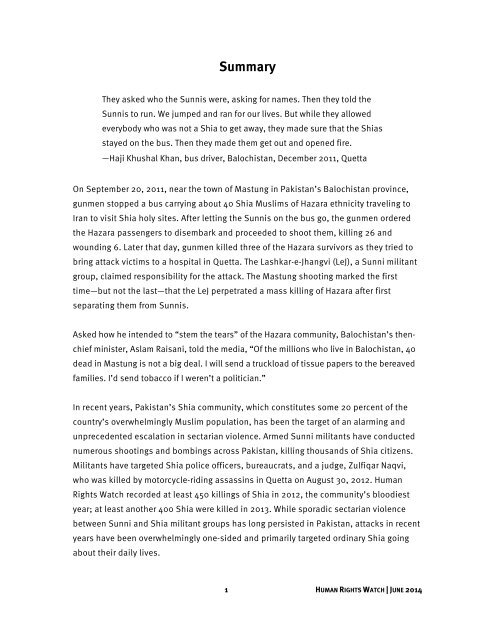pakistan0614_ForUplaod
pakistan0614_ForUplaod
pakistan0614_ForUplaod
Create successful ePaper yourself
Turn your PDF publications into a flip-book with our unique Google optimized e-Paper software.
Summary<br />
They asked who the Sunnis were, asking for names. Then they told the<br />
Sunnis to run. We jumped and ran for our lives. But while they allowed<br />
everybody who was not a Shia to get away, they made sure that the Shias<br />
stayed on the bus. Then they made them get out and opened fire.<br />
—Haji Khushal Khan, bus driver, Balochistan, December 2011, Quetta<br />
On September 20, 2011, near the town of Mastung in Pakistan’s Balochistan province,<br />
gunmen stopped a bus carrying about 40 Shia Muslims of Hazara ethnicity traveling to<br />
Iran to visit Shia holy sites. After letting the Sunnis on the bus go, the gunmen ordered<br />
the Hazara passengers to disembark and proceeded to shoot them, killing 26 and<br />
wounding 6. Later that day, gunmen killed three of the Hazara survivors as they tried to<br />
bring attack victims to a hospital in Quetta. The Lashkar-e-Jhangvi (LeJ), a Sunni militant<br />
group, claimed responsibility for the attack. The Mastung shooting marked the first<br />
time—but not the last—that the LeJ perpetrated a mass killing of Hazara after first<br />
separating them from Sunnis.<br />
Asked how he intended to “stem the tears” of the Hazara community, Balochistan’s thenchief<br />
minister, Aslam Raisani, told the media, “Of the millions who live in Balochistan, 40<br />
dead in Mastung is not a big deal. I will send a truckload of tissue papers to the bereaved<br />
families. I’d send tobacco if I weren’t a politician.”<br />
In recent years, Pakistan’s Shia community, which constitutes some 20 percent of the<br />
country’s overwhelmingly Muslim population, has been the target of an alarming and<br />
unprecedented escalation in sectarian violence. Armed Sunni militants have conducted<br />
numerous shootings and bombings across Pakistan, killing thousands of Shia citizens.<br />
Militants have targeted Shia police officers, bureaucrats, and a judge, Zulfiqar Naqvi,<br />
who was killed by motorcycle-riding assassins in Quetta on August 30, 2012. Human<br />
Rights Watch recorded at least 450 killings of Shia in 2012, the community’s bloodiest<br />
year; at least another 400 Shia were killed in 2013. While sporadic sectarian violence<br />
between Sunni and Shia militant groups has long persisted in Pakistan, attacks in recent<br />
years have been overwhelmingly one-sided and primarily targeted ordinary Shia going<br />
about their daily lives.<br />
1 HUMAN RIGHTS WATCH | JUNE 2014


